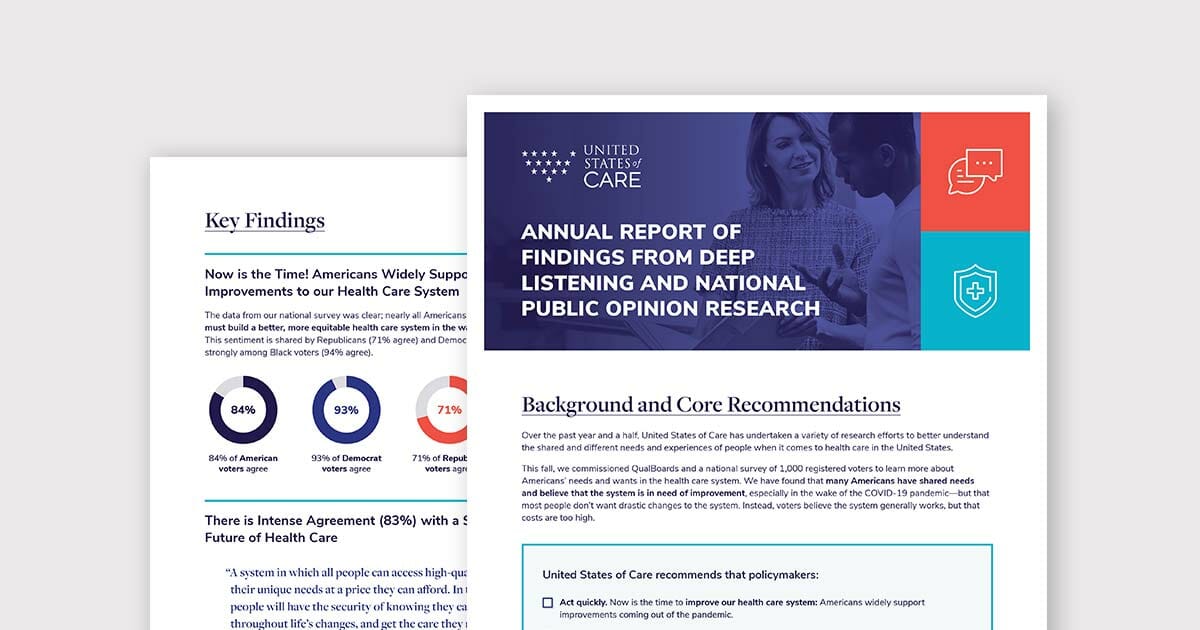Research, Resources
Findings From Deep Listening and National Public Opinion Research

Last month, we shared a blog post highlighting United States of Care’s intensive listening initiative—an approach to uniquely and deeply understand people’s needs in order to create more durable, people-centered health care policies. As part of that initiative, USofCare commissioned a national survey after the election of 1,000 registered voters to learn more about Americans’ needs and wants in the health care system, and to begin to shift the dynamic away from the partisan political debates that divide us and toward the areas in which we agree. This week, we were pleased to announce the findings of our survey.
One of the most resounding findings is that Americans want action on health care now. As the nation and the world have grappled over the past year with the COVID-19 pandemic, Americans feel that the time is right to fix the flaws in our health care system. In fact, nearly all Americans (84%) agree that we must build a better, more equitable health care system in the wake of the pandemic. This sentiment cuts across the political spectrum, with 71% of Republicans and 93% of Democrats calling for solutions. Black Americans, whose communities have been especially hard hit by the pandemic, agree strongly—94%. The message could not be more clear for policymakers: The time to take action is now.
However, policymakers should also tread carefully when considering how to best enact changes to the system. While recognizing problems in the system and the need for improvement, Americans are generally satisfied with the care they receive and the coverage they have. We found that 93% of respondents who have health insurance felt satisfied, and that a majority (54%) support improving the system through incremental changes, with the biggest problems being addressed first. Only a quarter (24%) wanted large-scale transformation to the system, while even fewer (13%) wanted to keep the system as it currently is.
Importantly, Americans appear to have coalesced around a shared vision for the future of health care. Eighty-three percent of voters agreed with a vision for a health care system in which “all people can access high-quality health care in a way that meets their unique needs at a price they can afford. In this improved, easy-to-navigate system, people will have the security of knowing they can depend on their health care coverage throughout life’s changes, and get the care they need, when and how they need it.” Looking closer, four clear goals for the future of health care stand out. Those are that:
- People have the certainty that they can afford their health care. Cost stood out as the main source of anxiety for Americans when it comes to health care and is at the top of the list for fixes. (57% of voters say this need applies to them.)
- People have the security and freedom that dependable health care coverage provides as life changes. Regardless of what happens in life—whether someone is diagnosed with a major illness, loses a job, grows older, or has unexpected expenses—people want to know they will have dependable coverage. (63% of voters say this need applies to them.)
- People can get the personalized care they need, when and how they need it. Care should be accessible when it’s needed and personalized to people’s individual needs. (64% of voters say this need applies to them.)
- People experience a health care system that is understandable and easy to navigate. The current system is complex and overwhelming. People want to be able to understand and navigate their health care system. (60% of voters say this need applies to them.)
Put simply, there is no time to waste in the effort to improve America’s health care system. As we approach the beginning of a new Congress and Presidential administration, USofCare has already begun incorporating the findings from our survey into our recommendations to leaders. Among those recommendations are the needs to:
- Act quickly. As noted above, Americans widely support making post-pandemic improvements to our health care system.
- Focus first on solutions that bring down costs in all aspects of the health care system, while preserving quality and dependability. One example of how to do this might be the creation of a public health insurance option—a proposal that has the support of more than 2-in-3 Americans, including over half (54%) of Republicans and the vast majority (80%) of Democrats.
- Recognize that there is a sense of urgency to make some improvements, especially related to bringing down the cost of care and making coverage more dependable following the pandemic. These improvements could include making mental health resources more available (supported by over 80% of respondents) and expanding access to virtual care (about which 87% of respondents had something positive to say).
- Recognize that most voters are satisfied with their existing care, and focus on areas to improve the system rather than seeking extreme changes. Most Americans (62%) believe the care they receive is, on average, better than most.
USofCare looks to 2021 excited about our plans to continue deepening our people-centered research. As we continue to learn, we look forward to sharing our findings and working with policymakers to create a health care system that is stronger and more equitable than ever before.